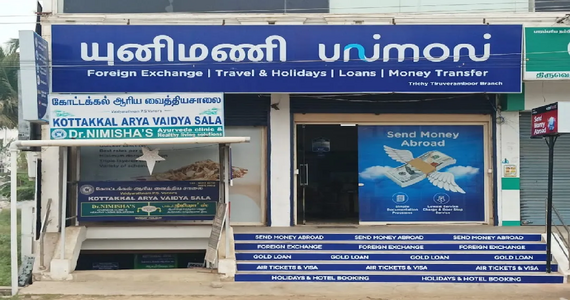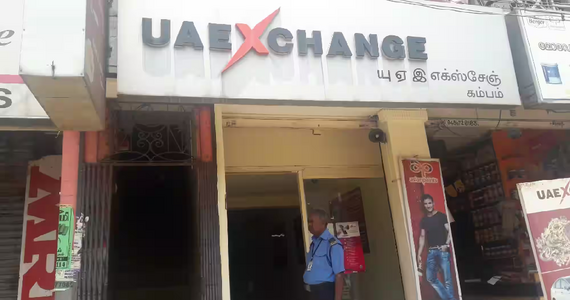
Pudukkottai, located in Tamil Nadu, is a growing town that offers convenient foreign exchange facilities through authorised dealers, banks, and licensed financial service providers. This guide covers everything you need to know — where to go, what to bring, how the process works, and safety tips — so that you can exchange money confidently during your visit.
1. What Is Forex?
“Forex” (foreign exchange) refers to the process of converting one country’s currency into another — for example, converting Indian Rupees (INR) to US Dollars (USD) or Euros (EUR), and vice versa.
In Pudukkottai, foreign exchange services are available mainly for:
- Tourists exchanging foreign currency into Indian Rupees.
- Residents purchasing foreign currency for travel abroad.
- NRIs and overseas visitors converting international currency for local expenses.
All foreign exchange transactions in India are regulated by the Reserve Bank of India (RBI) and can only be done through authorised dealers and money changers.
2. Authorised Forex and Currency Exchange Providers in Pudukkottai
There are several authorised money changers and banks in Pudukkottai where tourists can exchange currency.
Common Options Include:
- Banks – Almost all major banks provide foreign exchange services (buying/selling of foreign currency and travellers’ cheques). Examples include:
- State Bank of India (SBI)
- ICICI Bank
- HDFC Bank
- Indian Overseas Bank
- Canara Bank
- Authorised Forex Companies – Licensed private financial service providers specialising in currency exchange, travel cards, and remittance:
- Unimoni Financial Services Ltd (formerly UAE Exchange)
- UAE Exchange & Financial Services Ltd
- Muthoot Forex Ltd (some branches provide limited foreign exchange services)
- Travel Agencies with Forex Tie-ups – Certain travel agents in Pudukkottai coordinate currency exchange through authorised partners for customers booking tours abroad.
3. Documents Required for Currency Exchange
Indian law requires basic identification and proof of purpose for all currency exchange transactions. You should carry the following:
- Passport – Mandatory for all foreign nationals and Indian citizens exchanging currency.
- Visa or Air Ticket – Required if you are purchasing foreign currency for travel abroad.
- PAN Card – Required for transactions above ₹50,000.
- Proof of Address – Optional but sometimes requested for verification.
- Travel Itinerary – May be required when exchanging large sums for international trips.
Make sure to carry original documents and one photocopy.
4. How to Exchange Currency – Step-by-Step
Step 1: Identify Your Need
- If you’re a foreign tourist, you’ll be selling your foreign currency (USD, EUR, GBP, etc.) to receive Indian Rupees (INR).
- If you’re an Indian traveller going abroad, you’ll be buying foreign currency (for example, USD or AED).
Step 2: Visit an Authorised Dealer
- Choose a recognised forex service or bank. Avoid unauthorised street exchanges.
Step 3: Provide Documentation
- Present your passport, visa, PAN card, and travel documents (if applicable).
Step 4: Check the Exchange Rate
- Rates vary daily depending on market movement. Always ask for the current day’s rate and check whether there is a service fee or commission.
Step 5: Complete the Transaction
- Hand over the currency and receive either cash, a travel card, or travellers’ cheque (depending on your choice).
- Collect a printed transaction receipt (encashment certificate). This is important for future reference or refunds.
Step 6: Verify and Secure
- Count your cash carefully at the counter.
- Ensure you receive genuine notes — authorised centres verify authenticity before exchange.
5. Important Notes for Tourists
- Operating Hours: Most forex centres and banks operate between 10 AM and 6 PM, Monday to Saturday. Sundays are generally closed except for airport counters.
- Exchange Limits:
- Tourists can convert foreign currency up to the value permitted by RBI (usually up to USD 3,000 in cash for travellers).
- Indian residents can purchase foreign exchange up to the annual Liberalised Remittance Scheme (LRS) limit, currently USD 250,000.
- Receipts: Always collect and retain the exchange receipt as proof of transaction. It is required if you later reconvert leftover foreign currency.
- Travel Cards: If available, prepaid multi-currency travel cards are safer than carrying large amounts of cash.
6. Returning or Re-exchanging Unused Currency
If you have unused foreign currency after your trip:
- Visit an authorised dealer with your encashment certificate.
- Present your passport and receipt.
- You’ll receive the equivalent amount in Indian Rupees at the current buy-back rate.
Foreign tourists can re-exchange unused Indian Rupees back into foreign currency at departure airports within 60 days of their last exchange, provided they have valid encashment receipts.
7. Currency Conversion Tips
- Compare Rates: Different banks and forex agents may offer slightly different exchange rates. Compare before finalising.
- Avoid Airport Counters: Rates at airports tend to be less favourable due to higher service fees.
- Avoid Black Market Dealers: Unauthorised exchanges are illegal and unsafe. Always use RBI-licensed entities.
- Check Currency Notes: Avoid accepting torn, taped, or damaged notes as they might be rejected later.
- Use ATMs if Needed: Many international debit/credit cards can withdraw Indian Rupees directly from ATMs, although fees may apply.
8. Safety and Practical Tips
- Exchange only what you need. Carrying large sums of cash can be risky.
- Keep your passport and documents safely after verification.
- If you’re unsure about local addresses, ask your hotel front desk to guide you to the nearest authorised forex centre.
- Always count money discreetly and store it securely after exchange.
- During festivals or public holidays, confirm in advance whether forex branches are open.
9. Nearest Forex Hubs (if currency unavailable locally)
If the desired foreign currency is unavailable in Pudukkottai, nearby cities offer full forex facilities within short travel distances:
- Trichy (Tiruchirappalli) – 55 km away, has numerous forex centres, banks, and airport exchange counters.
- Madurai – 110 km away, provides a wide range of foreign currencies and 24-hour airport exchanges.

10. Quick Reference Summary
| Category | Details |
|---|---|
| Primary Forex Locations | Unimoni, UAE Exchange, major banks (SBI, ICICI, HDFC, Canara) |
| Documents Required | Passport, PAN, Visa or Travel Ticket |
| Operating Hours | 10 AM to 6 PM (Mon–Sat) |
| Transaction Proof | Encashment Certificate / Receipt |
| Safety Tip | Exchange only at authorised centres |
| Alternative Cities | Trichy and Madurai for rare currencies |
11. Final Advice for Visitors
- Pudukkottai offers essential forex facilities suitable for most tourists.
- For large or less common currency exchanges, consider visiting Trichy for faster service.
- Always exchange through official channels and avoid local intermediaries.
- Keep your receipts safe and note the location of your transaction for future use.
- If you use a hotel concierge, confirm that they are working with a licensed forex provider.
This comprehensive Forex and Currency Exchange Guide for Pudukkottai ensures that every visitor — domestic or international — can handle currency transactions smoothly, safely, and legally during their stay without requiring any additional information.